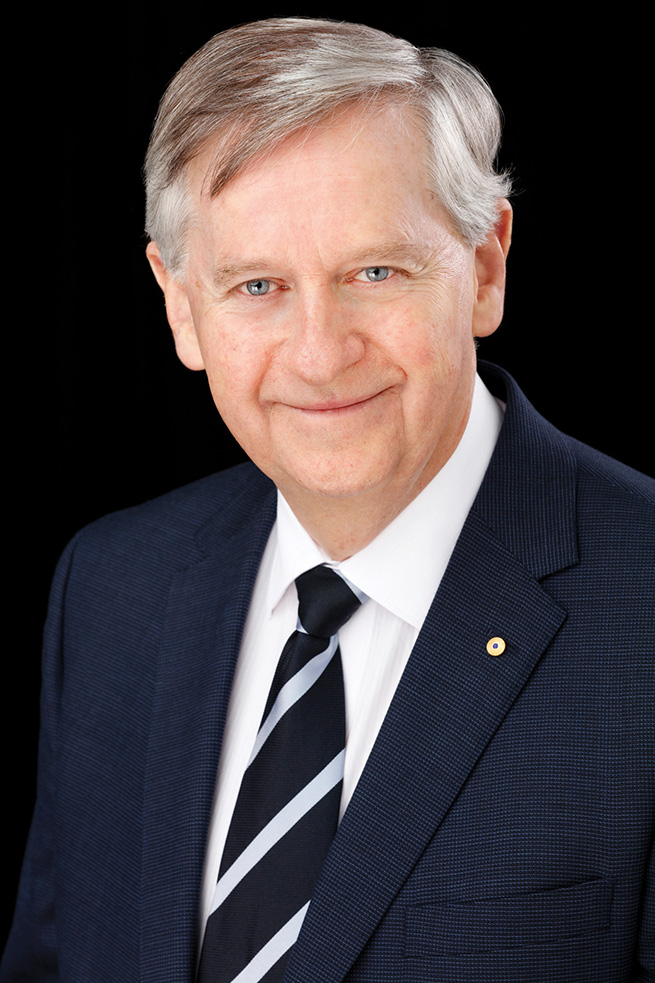This new O&G Magazine feature sees Dr Kirsten Connan in conversation with RANZCOG members in a broad range of leadership positions. We hope you find this an interesting and inspiring read. Join the conversation on Twitter #CelebratingLeadership @RANZCOG @connankf
Prof John Newnham AM
FRANZCOG
Prof John Newnham graduated in medicine from the University of Western Australia (UWA) in 1976. He pursued postgraduate training in O&G in Australia, South Africa (KwaZulu), the UK and the US. He completed a two-year Fellowship in Perinatology at UCLA, California, and returned to Australia in October 1984. Prof Newnham became a certified subspecialist in maternal-fetal medicine in 1992, was appointed the Inaugural Executive Director for Women and Infants Research Foundation in 1995, and accepted the role of Head of the School of Women’s and Infants’ Health (now Division of Obstetrics and Gynaecology) UWA in 1999. He continues to hold these, and many more, major appointments within Western Australia.

Prof Newnham has more than 390 publications and 12,000 citations. He has been involved in long-standing collaborations including the US, Canada, China, Japan, Netherlands, Germany, UK and Australia, and he remains an Adjunct Professor at Peking University, Beijing, and Honorary Director of Obstetrics at Nanjing University, China. The John Newnham Oration at the Annual Conference of the Australian and New Zealand DOHaD Society was named in his honour in 2015.
Prof Newnham’s enduring and career-long passion has been to discover and understand how events before birth may influence a person’s subsequent health and wellbeing, and how interventions at the earliest times may prevent lifelong illness. Prof Newnham is well known for the creation of the pregnancy-intensive lifetime cohort study, now known as The Raine Study (1989), and more recently the Australian Preterm Birth Prevention Alliance (2018). Both these initiatives were world-first programs and have contributed heavily to Australia being recognised as a global leader in preterm birth prevention and investigation of the early life origins of adult health and disease.
During his career, Prof Newnham has been awarded a total of $26m in competitive grant support, including 21 NHMRC ($15.6m) and six NIH (US$7.2m) grants.
Prof Newnham was a finalist for the Western Australian of the Year Awards (2019) and was recently awarded the prestigious Australian Medical Association (WA) Hippocrates Award for Outstanding Contribution to Medicine (2019).
What does a typical day look like for you?
My weekdays are allocated equally between clinical work (maternal-fetal medicine) and research, and I work to be intentional with my time, ensuring I avoid the noise, minimise travel, constantly prioritise and combat the FOMO to attend every meeting.
The highlights of each day are opportunities to interact with others. I am privileged to work with amazing colleagues and inspiring patients, as well as members of our community who support my passion for preterm birth prevention.
Weekends are with my family on our farm in Margaret River. Having the farm has enforced opportunities for relaxation, plenty of physical work and time away from medicine.
Why did you choose O&G and your career pathway?
Even as a young child I was fascinated with the origins of life, the ‘how’ and ‘where’ of life. Reading books on explorers was a staple of my childhood.
My original plan in medical school was to become a general surgeon in the Kimberley, but after a short stint in orthopaedics, I very soon realised this was not my craft group or area of interest. Falling back into my interest of the ‘how’ and ‘where’ of life, obstetrics soon became my true passion.
After six months of obstetrics in a Zulu hospital in South Africa (KwaZulu), with over 10 000 births a year, my thirst to research the early life origins of adult health and disease was ever stronger.
With perinatology an emerging field, I soon set off to California as the first from Western Australia to subspecialise in this area. The rest, as they say, is history!
What is the Raine Study?
The Raine Study is a cohort study of Western Australian children followed from 16 weeks gestation to adulthood, designed to investigate the developmental origins of health and disease.
This study was the world’s first pregnancy-intensive long-term cohort study extending into adulthood and recruited 2900 participants who are now 28–30 years of age. Four generations are included and more that 500 publications have resulted in providing invaluable information on development in fetal, child and young adult life across the fields of medicine, environment, employment and community. To date, the Raine Study has approximately 80 000 phenotypic variables on each participant and provides research opportunities for 150 scientists worldwide.
Data from the Raine Study continues to be used to refine antenatal care; provide the world’s best evidence that prenatal ultrasound studies are safe; define reference ranges for many developmental milestones; and explore hypotheses that are only possible when longitudinal data are available from participants across ages extending from fetal life up to their current 28–30 years.
Can you tell me about the background to the Whole Nine Months and the Preterm Birth Alliance?
I’ve spent more than 30 years researching the origins of preterm birth. During that time, our unit has apologised to many families for whom we have not been able to prevent their baby’s preterm birth. In response to our and others’ research and the aspiration to change preterm birth statistics, in 2014, I launched the Western Australian Preterm Birth Prevention Initiative. This included the release of new clinical guidelines, a state-wide educational outreach program for healthcare practitioners, a public health campaign for women and their families (‘thewholeninemonths’), and the commencement of a dedicated preterm birth prevention clinic at King Edward Memorial Hospital.
In its first full calendar year (2015), the initiative lowered the rate of preterm birth in Western Australia by 7.6 per cent and in the tertiary level centre by 20 per cent. The significant reduction extended from the 28–31 week gestational age group onwards. Calculation of the estimated number of preterm births averted in that year was 200, of which 45 were in the less than 31 week gestational age group.
The program was then expanded nationally, and in June 2018, this led the development of the Australian Preterm Birth Prevention Alliance with key partners from each state and territory. This Alliance is the world’s first national program aiming to safely reduce the rate of harmful early birth across its population.
How do you ensure work-life balance?
I did this badly in the early days, spending too much time at work. I am, however, fortunate to have a truly amazing wife (Susie) and three fabulous adult children (Elizabeth, Prue and Richard) who keep me engaged in other aspects of life.
Our family purchased a farm (beef) in Margaret River 31 years ago and this has forced me to keep busy physically on weekends. Over time, I have become much more balanced, but I remain just as committed and passionate about my work.
If you could, would you do anything differently in your career?
I would have loved a mentor when I began my specialist career. Prof Brian Trudinger and I were the first in Australia to practice in the area of ‘perinatology’, so we were very much ‘solo fighter pilots’. I also had to be a self-taught clinical academic because there was no senior person to
act as my mentor within obstetrics in Western Australia at that time.
What advice would you give to a trainee starting their career?
Enjoy it. Take every opportunity to learn. Always value your colleagues and your patients.
I have loved every minute of my career! Obstetrics is truly a wonderful specialty and we still have so many ‘unexplored continents’ to learn about.
What three words best describe your life?
Freedom to explore.
Are you willing to be contacted by trainees for career advice/mentoring?
Absolutely. My door is always open.






Leave a Reply